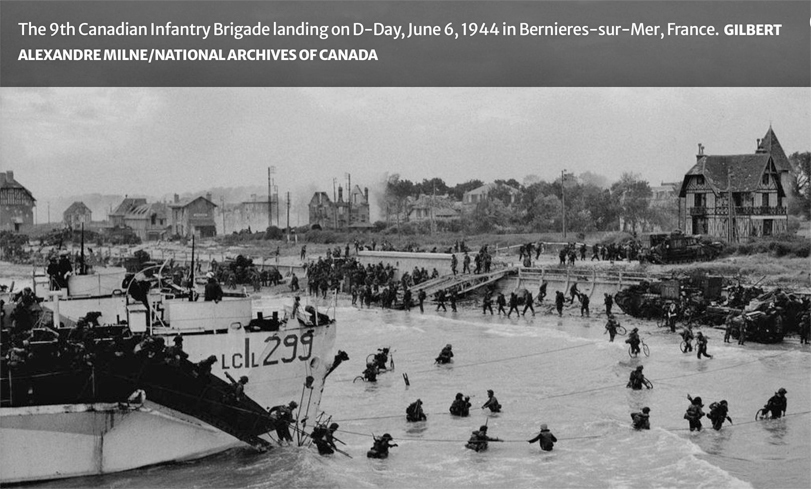
(The Hamilton Spectator – Saturday June 6, 2020)
Today is a good day to think of war, especially the one we often simply call “the war,” the war of our forebearers, that is our parents and grandparents and great grandparents.
One man in it was Sid James Stacey. Some decades later, when he was 80, Sid collected his old log book and published words and photos in a memoir as a gift for his family. His son, Sid Stacey Jr., a friend of mine, gave it to me. “Have a look,” he said. So I did
And I realized anew how war often involves just putting one leg at a time into your pants every morning despite your fears, in this case while on the tiring ocean, holding your old gun while the enemy sinks half your convoy before, months later, you eventually reach shore.
Then, in the UK, long weeks of training (in this case to be a tail gunner) to finally sit in the rear of some bomber where you’re turned backwards, looking into the night sky, unable to see where on God’s earth you’re flying, (Sid flew a tour of 30 bombing missions), stuck in a turret so tight that you can’t fit your parachute on your back.
This is war’s less than romantic side, like in a pub in Tempsford, England, where Sid once ran into Clark Gable, Hollywood’s leading man. There they are, talking, Gable with lousy teeth and no moustache. His teeth plates, and pencil moustache, are added for the movies, the actor explains. Oh. Like so much of life, war is just not what you expect.
But it can come any time, that flash, that blinding sensation, and you know you’re hit because your life seems to play before you like a flickering home movie. Then it’s over. Just like that. Imagine. This too is war, living in the everyday shadow of death. Multiply this by millions and know why these forebearers have been called The Greatest Generation.
There are other perspectives, like, say, from the German woman who’s draped across some park bench, eyes wide open, dead by suicide. In Berlin alone in 1945 there were 7,000 suicides, many of them women fearing gang rape, a tool of war used for retribution by incoming Russians on tens of thousands of German women. It’s a different view of VE Day.
It’s estimated 75-80 million human beings, more than half of them civilians and more than half of them Soviet and Chinese, perished in the Second World War. That’s about three per cent of the world population of 1940. Consider the deliberate massacres and mass bombings, then the horrible disease and starvation. There’s nothing like it in history.
The pandemic, which, worldwide, has now directly taken about 400,000 lives, more than one-quarter of those American, is a different animal. It’s brought its own suffering. Even so, on a good day, suffering of any type can make you, or me, more resilient and more gracious, more aware of both the beauty and fleeting nature of life.
C.S. Lewis, the British theologian, said, “God whispers to us in our pleasures, speaks in our conscious, but shouts in our pains. “Pain,” said Lewis, “is God’s megaphone to rouse a deaf world.” Or consider how suffering might help give you a “large intelligence and a deep heart,” as put by the Russian writer Dostoevsky.
Parents, the good ones anyway, know this. Your child faces a painful experience and you might even, at times, allow it because the pain will eventually help her, or him, grow into their truer self. I think about it because today, June 6, is not only D-Day, the beginning of the end of it all, the Second World War, but it’s also the day my own family’s life began with our eldest’s birth.
So it is a good day, it seems to me, to ask what we’re leaving behind, what’s in our log book, so to speak, in the everyday fear and thick of it: new times, hard times, changes no doubt for some more than others. Our health – physical, emotional, financial and spiritual – is the battleground.
And God only knows when we’ll see the beginning of the end, the full end, of the pandemic, this kind of life help that nobody really wants.

Thank you Thom! As John and I were reflecting on the same subject after supper last night. I personally am again reminded of the horror of war where I lost my Dad (in an concentration camp). A pain that never goes away for us as a family.
Also listening to the stories of Canadians growing up on this side of the pond without fathers. The long suffering and hunger of the last winter of 1944_45. It is good to know a Lord who cares intimately for us.
P.S. Happy birthday to your oldest daughter.
Best regards. Leny
Thank you Leny. Your family has been touched very much by war — and it’s made you who you are. Thanks for the greeting for Liz, also.
So thought-provoking, as always! Thank you, Thomas!